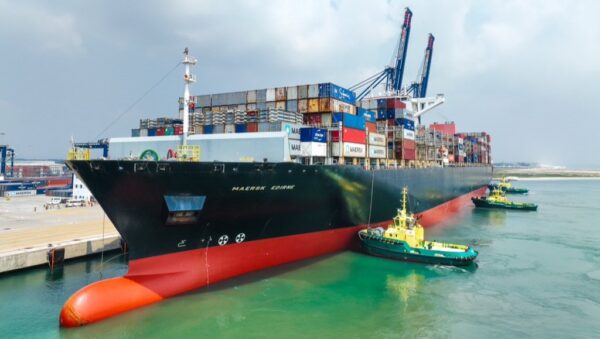Onitsha Port revival: Potential economic game-changer or another false dawn?

The first batch of ship arriving the Onitsha Port. Photo Credit- The Premium Times
The arrival of the first barge at Onitsha River Port in 2025 marks a symbolic milestone for Nigeria’s long-neglected inland waterways. Loaded with tiles from Ajaokuta in Kogi State, this event signals a tentative step toward revitalizing a facility that has been abandoned for decades despite its strategic location in the heart of the South-east. Built in 1983 under President Shehu Shagari and rehabilitated in 2012, the port has only seen sporadic activity since its reopening in 2018, primarily during the rainy season when the River Niger’s water levels allow for easy navigation. As someone who’s followed Nigeria’s infrastructure woes, I see this as a glimmer of hope for economic diversification, but one still filled with doubt. While the port could indeed ship in regional growth by slashing logistics costs and easing pressure on overburdened roads and seaports, the entrenched challenges of insecurity, bureaucratic inaction, and environmental limitations threaten to undermine its potential. This piece however, is set to critique both the rosy projections and the harsh realities, arguing that without bold, immediate reforms, Onitsha risks becoming yet another underutilized white elephant in Nigeria’s development landscape.
Perhaps I begin properly on the positive side, the economic upside of a fully operational Onitsha Port is hard to overstate, and it’s about time the South-east reaps the benefits of its geographic advantages. Port Manager Martins Osazuwa’s claim that the facility could generate N10 billion annually—if not up to N100 billion with full utilization, highlights its role as a “golden egg” for the eastern region. Imagine decongesting Lagos’ Apapa and Tin Can ports, where chronic gridlock costs businesses millions in demurrage fees and delays. By shifting cargo to inland waterways, importers in the South-east could bypass the treacherous Lagos-Onitsha highway, notorious for its potholes, armed robberies, and fuel-consuming trucks that only increase inflation through higher transport costs. This shift could lower the price of goods like the tiles on that inaugural barge, stimulating local manufacturing and trade.
RELATED STORIES
Climate change: A growing threat to Nigeria’s agricultural sector
GMO debate heats up in Nigeria: A battle for food sovereignty amid crisis
Broader implications include job creation in logistics, warehousing, and auxiliary services, potentially injecting vitality into Anambra’s economy and beyond. Critically, it aligns with Nigeria’s push for multimodal transport, reducing road wear and carbon emissions, a win for environmental sustainability in a country grappling with climate damage. If leveraged properly, Onitsha could foster intra-African trade under the AfCFTA, positioning the South-east as a hub for goods flowing from the North and Central regions. However, these benefits aren’t automatic; they hinge on patronage from stakeholders who’ve long defaulted to road haulage due to habit and perceived reliability. Osazuwa’s call for incentives like tax breaks is spot-on, but it remains a question whether vague appeals will suffice in a system filled with policy inconsistencies.
However, for all the hype, the challenges facing Onitsha Port are formidable and expose deeper systemic failures in Nigeria’s governance. Seasonal operations tied to the River Niger’s fluctuating water levels are a glaring vulnerability, why has dredging been delayed for years despite repeated promises? This isn’t just a technical issue; it’s a sign of federal neglect toward the South-east, where infrastructure projects often stall amid political uprising. Insecurity poses an even graver threat: militant youths, pirates, and general lawlessness along waterways deter investors and shippers alike. Low patronage stems from this fear, creating a vicious cycle where underuse justifies further underinvestment.
Moreover, the port’s history of dormancy, neglected for decades even after construction and rehabilitation, raises doubts about sustainability. Will the federal government provide the security patrols and dredging contracts needed, or will this be another initiative abandoned after the initial fanfare? State governments must step up too; Anambra’s administration should collaborate on marketing the port to businesses, perhaps through public-private partnerships. Critiquing further, the overeliance on government intervention ignores market dynamics, why not privatize aspects of operations to attract efficient operators? Environmental concerns, like siltation from upstream activities, add another layer, potentially worsening with climate change. Though these hurdles seem impossible, but they demand accountability: if Osazuwa’s projections are to materialize, transparency in fund allocation for dredging and security is non-negotiable.
RELATED STORIES
Opinion: How Sports Can Address Nigeria’s Insecurity, Promote Peace, Economy
NFIU: Nigeria’s abduction crisis and failed governance
So much is left to be discussed in this piece but I consider it wise to lower the anchor, the Onitsha Port’s 2025 barge arrival is a commendable start, but it’s no panacea for Nigeria’s economic ills. The potential to boost growth through cost savings, job creation, and decongested trade routes is real and urgent, especially for a region that’s felt marginalized. However, without addressing insecurity, dredging delays, and low engagement head-on, this could devolve into another tale of wasted opportunity. Policymakers should prioritize incentives, robust security, and year-round operation to unlock the port’s full value. As a critic, I’m cautiously optimistic: Nigeria has the resources; what it lacks is the will. Let’s hope this “golden egg” doesn’t crack under the weight of inaction.




